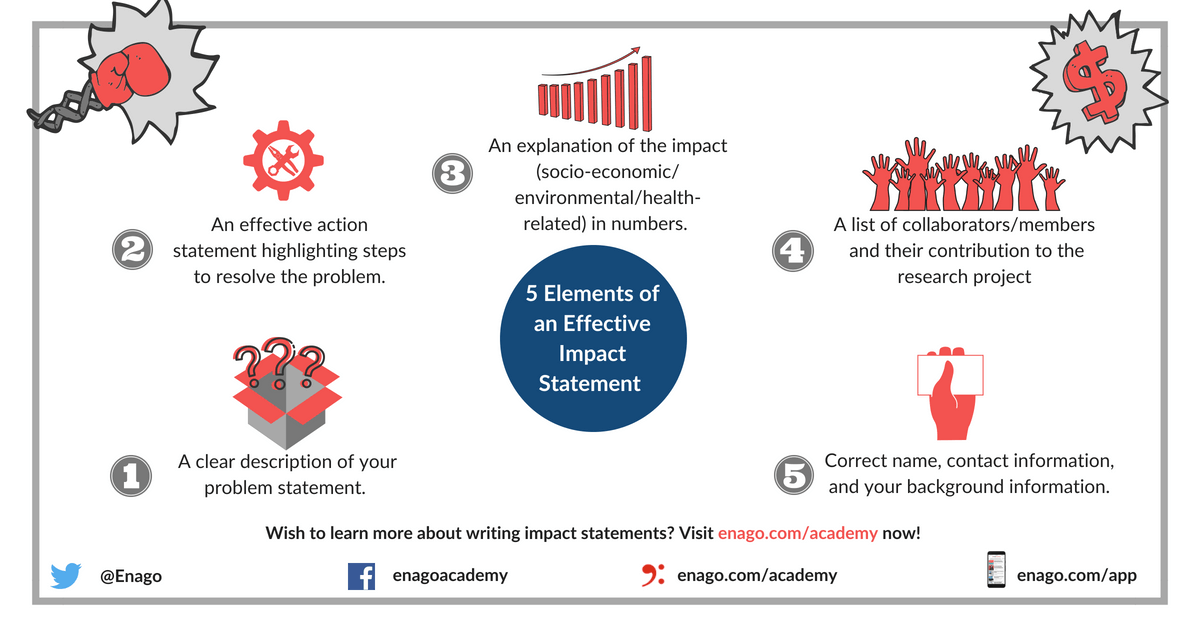Writing an Impact Statement: Four Things You Need to Know

An impact statement is a short document that explains the significance of your research work. Researchers or students often use impact statements to answer questions related to the impact of their research on the current knowledge in that field or socioeconomic/environmental outcome. The impact statement is used to inform and convince different stakeholders. Who are these stakeholders? Stakeholders are often the people in charge of allocating funds—university administrators, grant program facilitators, or government policy makers. Therefore, it justifies why researchers need to further their current research or pursue a new area of interest.
Sections of an Impact Statement
Given that impact statements although necessary, do not directly advance research, writing one can be quite tedious. The grant funders or employers may ask you to submit it before the allocation of funds or beginning of a research project/program.
Impact statements follow a standard format. Typically, it consists of the following five elements, in this order:
- A clear description of the issue or problem that your research addresses. Often you can adapt the problem statement from your recently published articles or conference presentations.
- A statement of the action you are taking or intend to take to resolve the problem. This action statement should directly refer to the problem statement you wrote in (1).
- An explanation of the impact. This is the most important part of the impact statement. You need to describe clearly who benefits from your work and in what ways. You can focus on multiple different levels of benefit—individual, organizational, community, or social benefits, as well as benefits to the research community.
- A list of the people involved in the research, other than yourself. Any collaborators, including institutions you are working with to complete the research, need to be listed in this section. Stakeholders will be looking to understand what each member of the research team is contributing to the project.
- Your name and contact information, and (sometimes) a brief description of your background and involvement in the project.
Although some universities and funders might have other formats they prefer for the impact statement, this simple formula will work in the majority of cases. Check the requirements for your specific case before using the guidelines presented here.
Related: Done drafting an effective impact statement for your research proposal? Check out this section today!
Top 4 Tips for Impact Statement
These tips will help you make your impact statements strong and impactful.
- Think about your audience when you write the impact statement. If you are writing an impact statement for people who are not researchers in your field, do not emphasize your work’s contribution to research in your field! Instead, focus on how the research will benefit broadly. Avoid overly specialized or technical language. Your readers may not be experts at what you do. Your impact statement needs to convince them that your work is important, even if they do not know all the arcane terminology you use on a daily basis.
- Use numbers to describe the impact of your work. For example, you can say how many people you have helped (for example, a number of participants in an extension program or clinical trial), how long your work has lasted or will last or how many people might be reached by a report you intend to write. Numbers help understand the importance of your work.
- Keep the impact statement short and meaningful. Your action statement should be very brief, just summarizing what you have done, so you can get the benefits of the work. People who read impact statements do not need to know every detail of your research.
- Proofread the impact statement, and have someone else proofread it, too to avoid unnoticed mistakes or typos.

If you have any other tips that have helped you write great impact statements, be sure to share them with us in the comments section below!





Thanks so much for your guidance.
I am a beginner but motivated learn more in writing impact statement
Regards,
Pedro
Thank for a clear guidance to impact writing for beginners like me.
that’s really helpful thx!
direct and to the point, quick help for homework
Thank you now I understand what an environmental impact statement mean and how is writing.